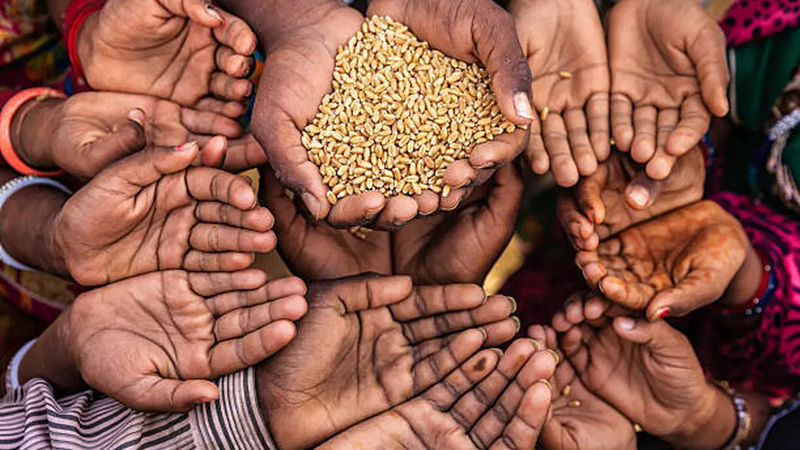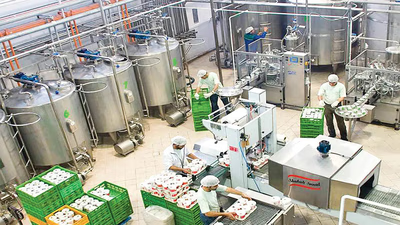
Exploring food security and trade in the Middle East region.
Water scarcity is a major concern in many Middle Eastern countries due to limited freshwater resources and high population densities. Agriculture, a significant consumer of water, faces challenges in sustaining crop production. Some countries have implemented innovative solutions such as water desalination, drip irrigation, and water recycling to address this issue. Several countries in the Middle East heavily rely on food imports to meet their domestic food needs. This dependency poses vulnerabilities to global price fluctuations, trade disruptions, and supply chain disruptions, as experienced during the COVID-19 pandemic. It highlights the importance of diversifying food sources and promoting local agricultural production.
Considering the importance of providing food and drink products in human survival, food industry in its general sense is one of the first industries in human history and is considered one of the basic industries. Population expansion, increase in public welfare, change in eating habits and lifestyle are among the most important factors affecting the growth of this industry at the global level after the technological revolution of the 21st century. In all countries of the world, the food industry has a significant impact on creating employment and added value, and the Middle East is no exception to this rule.
The food industry in West Asia, due to the climatic conditions, diversity and favorable quality of agriculture, has many importance and benefits and has had the highest contribution in creating employment in the countries of the region. Predictions are based on the fact that this sector will have the possibility of developing employment in the region more than other industrial sectors due to the high share of the food industry in the household goods basket and on the other hand due to access to quality raw materials and cheap labor. .
If the war disrupts the supply of wheat, the Arab world will suffer. Currently, the countries of the region are looking for alternatives so that they can import the wheat and grains they need from these countries. The war in Syria has caused 12.4 million Syrians to starve. And this was while this country was self-sufficient in terms of wheat until 2011, when it was attacked by ISIS. It has been said that the war in Ukraine will increase the number of hungry people in the countries of the Middle East region.
While access to food is a key component of food security, ensuring access to nutritious and diverse diets is equally important. Some countries in the region face challenges related to malnutrition, including micronutrient deficiencies and increasing rates of non-communicable diseases due to dietary changes and lifestyle factors. The Arab world, which has not yet been able to recover from the effects of the epidemic and severe droughts in several North African countries, is now facing the highest increase in product prices due to the war. According to what has been received from news sources, if the war continues, the problem of providing grain for the countries of West Asia and North Africa will intensify because there is practically no alternative for providing grain in the short term.
The region's arid and semi-arid landscapes limit the availability of arable land for agriculture. Urbanization and desertification further reduce the amount of cultivable land. These land constraints make it challenging to expand agricultural production and increase self-sufficiency in food production. The Middle East is highly vulnerable to the impacts of climate change, including rising temperatures, irregular rainfall patterns, and increased frequency of extreme weather events. These changes affect agricultural productivity, livestock rearing, and overall food production. Adapting to climate change and implementing sustainable agricultural practices are crucial for ensuring food security.
Political conflicts, civil unrest, and displacement in various parts of the Middle East have disrupted agricultural activities, damaged infrastructure, and hindered access to food. These conflicts have led to food shortages, malnutrition, and food insecurity for affected populations. Resolving conflicts and promoting stability are essential for improving food security in the region. Food waste is a significant concern in the Middle East, with a considerable amount of food being lost at various stages of the supply chain, from production to consumption. Addressing food waste through improved storage, processing, and distribution systems can help reduce losses and improve overall food security.
-

West Asian countries are advancing their food production through modern agricultural practices, including advanced irrigation, hydroponics, and greenhouse cultivation. These methods optimize water use and increase crop yields, particularly in arid regions. The region is also seeing a rise in organic farming, driven by consumer demand for healthier options and sustainable practices. To enhance food safety, traceability systems are being implemented, allowing for the tracking of food products from farm to consumer. The growth of food technology startups is transforming the industry, utilizing AI, blockchain, and data analytics for improved production and distribution. The food packaging industry is evolving, focusing on modern devices to reduce human intervention and enhance efficiency. With a diverse food industry that includes sectors from dairy to snacks, the emphasis on quality packaging and storage methods is crucial for maintaining product integrity. Governments are enforcing stricter food safety regulations, while investments in food processing technologies are increasing.
This includes the development of ready-to-eat meals and convenience foods to meet changing consumer lifestyles. Sustainable packaging solutions are gaining traction, with techniques like modified atmosphere packaging being adopted to prolong shelf life. Additionally, robust cold chain infrastructures are being established to ensure the quality of perishable goods, reflecting a commitment to food safety and quality in the region.
-

Water scarcity is a pressing issue in the Middle East, impacting agricultural productivity and food security. Countries in the region are increasingly reliant on food imports to satisfy domestic needs, leading to vulnerabilities in the face of global price fluctuations and supply chain disruptions, as highlighted during the COVID-19 pandemic. Innovative solutions such as water desalination and drip irrigation are being implemented to mitigate water scarcity. The food industry plays a crucial role in employment and economic value creation in West Asia, with potential for growth due to favorable agricultural conditions and access to quality raw materials. However, ongoing conflicts, such as the war in Syria and the Ukraine crisis, exacerbate food insecurity by disrupting grain supplies and increasing prices. Malnutrition and dietary challenges persist, driven by lifestyle changes and economic factors. Climate change poses additional risks, affecting agricultural productivity and livestock rearing. Addressing food waste is also critical, as significant losses occur throughout the supply chain. Overall, enhancing local agricultural production, diversifying food sources, and implementing sustainable practices are vital for improving food security in the Middle East.
-

Halal food, essential in Middle Eastern cuisine, adheres to Islamic dietary laws, prohibiting pork and alcohol while emphasizing specific preparation methods. Staples like rice, wheat, and legumes form the foundation of many dishes, complemented by flatbreads such as pita and naan. Hospitality is paramount, often showcased through communal meals featuring roasted meats. The cuisine is characterized by grilling, roasting, and slow cooking, with popular dishes including shawarma and kebabs. Middle Eastern food is renowned for its freshness, health benefits, and aromatic qualities, leading to a global interest in its recipes. Mezze, a style of dining with small shared plates, highlights various dips and appetizers. Spices like cumin and cardamom, alongside herbs such as parsley and mint, enhance the flavors of lamb, chicken, and beef dishes. Desserts like baklava and kunefe showcase the region"s rich culinary traditions.
Coffee and tea play significant roles in social interactions, with traditional preparation methods reflecting the region"s hospitality culture. The global appeal of Middle Eastern cuisine continues to grow, driven by its unique flavors and health-conscious ingredients.
-

Asian cuisine is characterized by its diversity and bold flavors, with rice and noodles as staples across many countries. Fresh, seasonal ingredients play a vital role, enhancing both taste and nutritional value. Cooking techniques like stir-frying preserve the texture and nutrients of food. The Asian food market is rapidly expanding, projected to double to over $8 trillion by 2030, driven by a growing middle class and increasing consumer spending. The return of restaurant dining post-pandemic has further fueled this growth. Countries like Japan and Thailand are seeing a rise in food enthusiasts, impacting the global food industry. Street food culture is integral, showcasing local flavors and offering diverse options. Each region has unique culinary traditions, with common elements such as the use of various condiments and spices.
As consumer health awareness rises, there is a shift towards plant-based alternatives, particularly in markets like Singapore, Japan, and China. The food industry in Asia, especially in basic products and seasonings, significantly contributes to the region"s economic prosperity."
-

West Asia faces significant challenges in food production due to arid climates, limited water resources, and urbanization, which restrict agricultural activities. The region"s reliance on food imports makes it vulnerable to global price fluctuations and trade disruptions. Climate change exacerbates these issues, leading to crop failures and livestock losses. Political instability further complicates the situation, disrupting supply chains and causing food shortages. The ongoing conflict in several Middle Eastern countries has led to high food prices and increased food insecurity. The region"s growing population and shifting dietary preferences towards resource-intensive foods heighten the demand for a diverse and sustainable food production system. Inadequate infrastructure and post-harvest management contribute to significant food waste, compounding the challenges of ensuring food security. As countries like Morocco leverage their fertilizer production capabilities, there is a pressing need for effective monitoring of food supply chains and strategic regulation to support local producers and meet consumer needs.
The food industry, while essential, faces pressures that often compromise product quality. Companies like Poya Vision prioritize health and quality in food imports, highlighting the importance of sustainable practices in addressing the region"s food security challenges."
-

Asian food manufacturers produce a wide range of products, including snacks, beverages, and processed foods, reflecting the diverse cuisines of the region. They blend traditional recipes with modern technology to ensure authenticity while meeting contemporary demands for convenience and quality. These manufacturers adhere to strict quality and safety standards, following local regulations and global certifications like ISO and HACCP. With advanced production facilities and a strong export-oriented approach, they cater to both domestic and international markets. Many engage in private label and contract manufacturing, allowing them to customize products for retailers and food service providers. Sustainability and traceability are increasingly prioritized, with manufacturers adopting eco-friendly practices and implementing systems to ensure product authenticity. Research and development play a crucial role in introducing innovative products that align with evolving consumer preferences. Notable companies like Mitsubishi and Tsing Tao lead the industry, showcasing the prominence of Asian food brands globally. Overall, the Asian food manufacturing sector is a dynamic and growing hub, contributing significantly to the global food supply.






